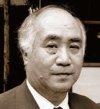 Takeshi HaraBy Hugh Ashton
Takeshi HaraBy Hugh Ashton
How one Tokyo entrepreneur is taking the heat off fried foods
For a long time, it has been known that deep-fried foods cause health problems. Not only do French fries, a guilty pleasure for many, increase their eaters’ weight, with all the health risks associated with obesity, but the oil oxidizes at the temperatures associated with frying starchy foods and oxidized oil poses many questions regarding health.
Wouldn’t it be great if there was a way to enjoy these fried treats without continually having to worry about the possible dangers to one’s health?